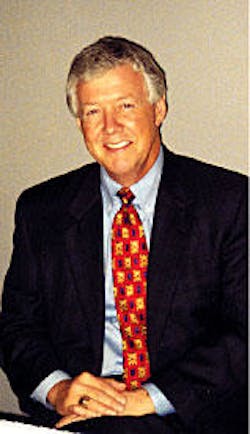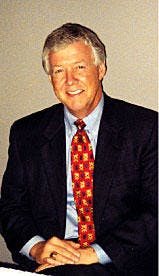UK energy minister calls for accelerated UKCS development
A push to move UK North Sea acreage into the hands of operators inclined to conduct immediate exploration and development work drew early attention from government and industry officials at the Offshore Europe conference held in Aberdeen early last week.
Brian Wilson, UK Minister of State for Industry and Energy, challenged the oil and gas industry "to unlock the hundreds of fields lying unexploited on the UK continental shelf (UKCS)."
He said the area has 250 "fallow fields" and 250 unused licenses.
"No one should doubt the government's resolve that licenses should be in the hands of companies who want to develop them. Hundreds of fallow fields and unused licenses are a luxury which we can no longer afford."
Wilson noted that the UK system gives operators much room to determine the pace of development. But the UKCS, with its diminishing average field size and general maturity, make the government, "entitled to ask for firm plans or else for alternative proposals."
Kerr-McGee reaction
Luke R. Corbett, chairman and CEO of Oklahoma City-based Kerr-McGee Corp., acknowledged the need for accelerated development but said forcing fallow blocks onto the market "isn't the answer."
He linked activity on yet-undeveloped acreage to access to well information, which he called a key to growth in the UKCS.
"There absolutely needs to be acceleration in how quickly information from drilled wells becomes generally available to all of the producers within the basin," Corbett said.
If basic geologic, engineering, production, and seismic information were more generally available, he argued, fallow and unused acreage could be efficiently recycled from leaseholders uninterested in it to operators with new ideas. And there is no mystery in mechanisms for the recycling.
The UK sector of the North Sea "is the exception, not the rule," he said. Canada, the US Gulf of Mexico, West Africa, and Brazil set time limits for offshore work.
"The results are proven: Required relinquishments stimulate exploration activity."
Independent operator responds
Representatives of a small operator and a large major company elaborated on the subject in a later session.
Bruce Dingwall, chief executive of Venture Production Co. Ltd., Aberdeen, said companies like his seek opportunity in inefficiency of current UKCS ownership. He explained that only about 20 active operators work in the region, and all but four of them are relatively large and well-established. Oriented to the large fields characteristic of the 1970s through 1990s, they now find themselves with much different assets because of what Dingwall called a "fundamental shift in the scale of the business."
He said the industry is "institutionalized by billion-barrel processes, billion-barrel timetables, and billion-barrel schemes."
Yet most UKCS discoveries and undeveloped fields have reserves no greater than 10 million bbl.
And he asserted that there hasn't been a recent operator change in which the field reserves failed to grow in new hands and in which abandonment didn't recede in time.
Shell's view
From the other end of the size spectrum, Tom Botts, managing director of Shell UK Exploration & Production Co., agreed with the need to adjust UK holdings but warned against expectations that an overhaul of UKCS ownership would create a surge in activity.
Most fallow fields are undeveloped for good reasons, Botts noted.
Because of reservoir complexity and other operating challenges, "these are very difficult things that are left in the portfolio."
Botts added: "Sitting on undeveloped assets is not something that appeals to Shell. It doesn't appeal to anybody."
Forcing fallow blocks onto the market isn't the answer...The key to growth in activity on the UK Continental Shelf undeveloped acreage is faster access to well information. There absolutely needs to be acceleration in how quickly information from drilled wells becomes generally available to all of the producers within the basin. If basic geologic, engineering, production, and seismic information were more generally available, fallow and unused acreage could be efficiently recycled from leaseholders uninterested in it to operators with new ideas.

